The field abuts the grey wall Turkey built along the length of its border with Rojava and the new stream originates on the Turkish side of the barrier. In summer, it smells and attracts bugs.
As a barefoot toddler plays behind her, Nasan says the stream affected the quality of her well water, which has turned salty and taken on a brownish hue.
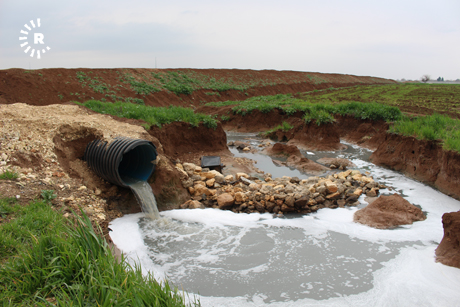
Municipal wastewater flows out of a pipe into a field east of Kobane city on February 26, 2019. Photo: Hannah Lynch/Rudaw
“We are worried; we don’t know what Turkey is doing,” said Nasan. “We hope they’ll stop the stream. We want to see clean water in our wells.”
Only two wells in the village are still clean, according to village head Osman Ali Nusman Khalil.
He accused Turkey of deliberately contaminating their land and water.
“What can we do? This is an enemy of Rojava, trying to kill us in many ways,” he said.
Nasan’s family has no choice but to keep using their well water, though she says they try to reduce the risk of consuming any contaminants using a simple (and ineffective) technique of filling a barrel with water, letting it settle, and using just the top layer, discarding the rest.
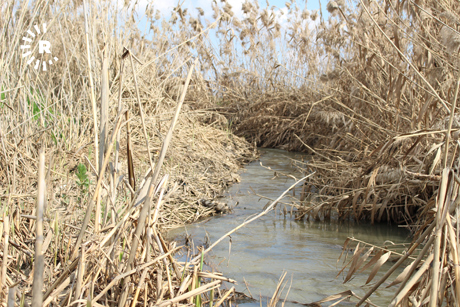
Municipal wastewater flows through a stand of reeds on the edge of Kobane, on February 25, 2019. Photo: Hannah Lynch/Rudaw
The village asked the Rojava government for help, but were told the authorities can’t do anything. They lack the money, expertise, and the personnel. This is a common refrain in the autonomous region of northern Syria where the Kurdish-led administration has built a quasi-state but is hemmed in by neighbours with whom relations range from frosty to openly hostile.
Rojava is, to a large extent, dependent on the benevolence of foreigners to fund and oversee big-budget projects like waste management. Officials across Rojava said they have shown representatives of European organizations the problems they face, like lack of water treatment facilities, and were given promises of help. But they have seen little results.
The city of Sari Kani also has a water problem. Last summer the municipality issued a ban to stop farmers using water from the Khabur Deresi, a small cross-boundary river that originates in Turkey and had become so polluted that it was making people sick.
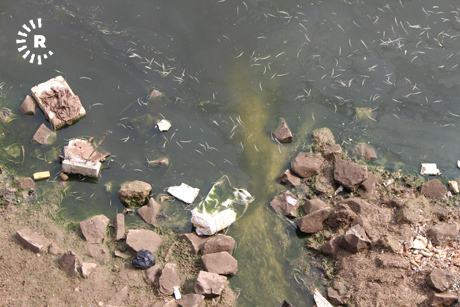
The polluted water of Khabur Deresi on February 23, 2019. Photo: Hannah Lynch/Rudaw
Children were more severely affected, explained Mahjoub Heso, the administrative manager of Sari Kani’s Rojava Hospital. In the dry summer season, people are more dependent on the river when wells run dry and the hospital sees two or three people with stomach complaints and vomiting daily.
In rainy winters, there is ample well water or, if people do have to use the river, the water is higher and the pollutants are diluted. In that season, the hospital was only seeing about five cases of stomach complaints per month.
They have also recorded cases of liver cancer, believed to be caused by the water, added Heso.
Officials boiled the problem down to farmers using the river water on their crops. The municipal administration tested the water about two years ago.
“More than 90 percent of it is wastewater,” said Abdo Salam, from the city’s agriculture office.
The river originates in Turkey and used to be high and fast flowing. “We used to swim in that river,” hospital administrator Heso recalled with a smile. They also fished. If it was polluted, they didn’t notice.
The volume of the river has dropped dramatically, the flow not much more than a trickle in some places. It has also become a dumping ground for locals.
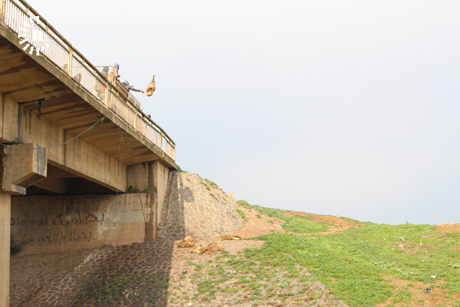
A man tosses a fresh sheepskin over the side of the bridge to the banks of the Khabur Deresi below on February 23, 2019. Photo: Hannah Lynch
Last summer, the city’s authorities banned using the water and this winter there was a big improvement in the health of the city, said Heso. The real test though will come this summer.
More than seven villages relied on the river — some 200 to 300 farmers growing corn, wheat, watermelon, and vegetables. Unable to use the river water, farmers are dependent solely on their wells. Some have had to scale back the size of their crops because of a lack of water.
In 2015, the city’s government connected with Turkey’s pro-Kurdish Peoples’ Democratic Party (HDP) across the border in a bid to resolve the problem. HDP promised to help, but as an opposition party it was not able to convince the Turkish government to act, according to Abdulaziz Saleh who was mayor of Sari Kani at the time.
Turkey’s own infrastructure is cracking under the strain of hosting some 3.5 million Syrian refugees. In March 2017, a new waste transfer station for Sanliurfa province, across the wall from Sari Kani, was inaugurated. The project was funded by the European Union and executed by the United Nations Development Programme (UNDP) to ease some of the pressure the influx of refugees put on the waste treatment systems.
The problem, however, doesn’t only come from Turkey. Some Rojava cities are dumping their own municipal waste into the environment, untreated.
Syria’s civil war came to Sari Kani in late 2012 when groups of the Free Syrian Army (FSA) attacked Syrian army posts in the city. The Kurdish People’s Protection Units (YPG) evicted the remaining Syrian army elements and after weeks of clashes reached a ceasefire with the FSA in early 2013 that saw the militias withdraw from the city, which subsequently joined the Rojava administration.
During the clashes, however, FSA elements stole equipment from Sari Kani’s water treatment facility, according to the municipal administration. Without the money to get the necessary parts for repairs, Sari Kani has not treated its municipal waste since 2012. It is now dumped about 45 kilometres outside of the city.
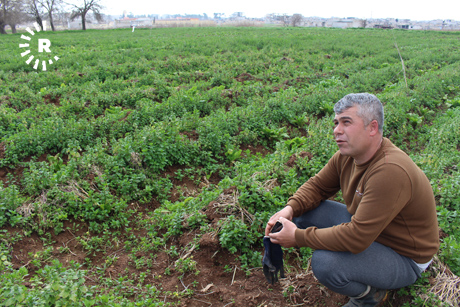
Osman Hassan sits in his small field sandwiched between Kobane and Turkey’s border wall on February 25, 2019. Photo: Hannah Lynch/Rudaw
Kobane is doing the same, creating a potential health hazard. The city is being rebuilt after it was destroyed in the first major defeat of ISIS in 2015. While construction crews are busily filling the skyline with new apartment buildings and businesses, the city does not have facilities to treat its municipal waste.
Osman Hassan sits in his small field sandwiched between the city and Turkey’s wall. A line of reeds borders one side of his field. The reeds are growing in a stream of murky green water that gives off a pungent odor — some of the city’s municipal waste.
Hassan has a well and uses that to irrigate his vegetable crops, but says the well water is not enough for his wheat. For that he uses the stream of waste water.



Comments
Rudaw moderates all comments submitted on our website. We welcome comments which are relevant to the article and encourage further discussion about the issues that matter to you. We also welcome constructive criticism about Rudaw.
To be approved for publication, however, your comments must meet our community guidelines.
We will not tolerate the following: profanity, threats, personal attacks, vulgarity, abuse (such as sexism, racism, homophobia or xenophobia), or commercial or personal promotion.
Comments that do not meet our guidelines will be rejected. Comments are not edited – they are either approved or rejected.
Post a comment